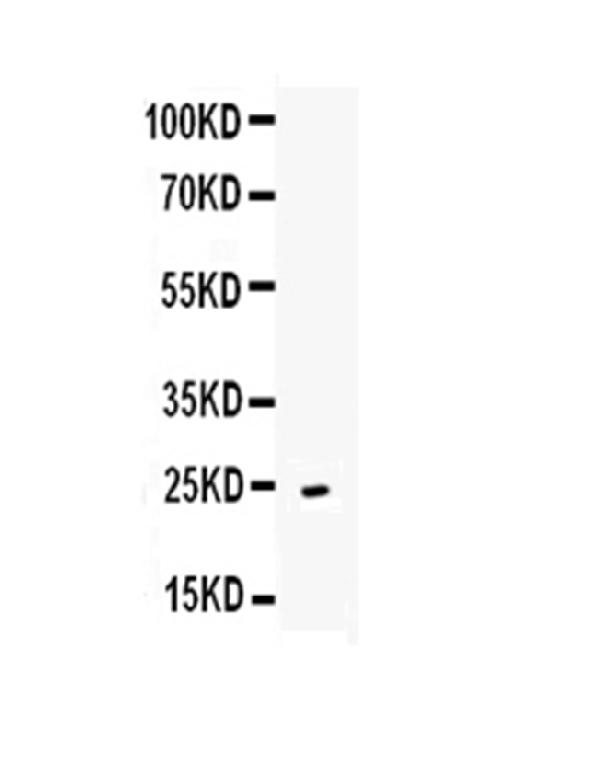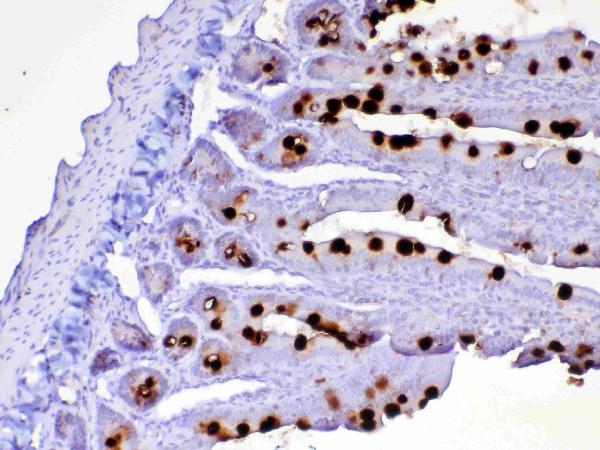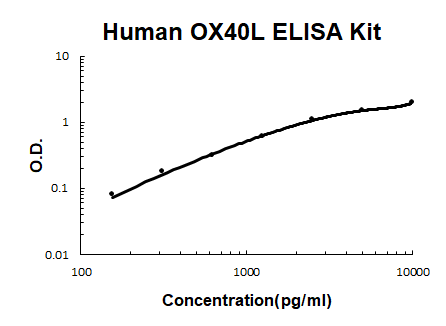Product Info Summary
| SKU: | A02554-1 |
|---|---|
| Size: | 100 μg/vial |
| Reactive Species: | Mouse, Rat |
| Host: | Rabbit |
| Application: | IHC, WB |
Customers Who Bought This Also Bought
Product info
Product Name
Anti-CD252/Tnfsf4 Antibody Picoband®
View all OX40 Ligand/TNFSF4 Antibodies
SKU/Catalog Number
A02554-1
Size
100 μg/vial
Form
Lyophilized
Description
Boster Bio Anti-CD252/Tnfsf4 Antibody Picoband® catalog # A02554-1. Tested in IHC, WB applications. This antibody reacts with Mouse, Rat. The brand Picoband indicates this is a premium antibody that guarantees superior quality, high affinity, and strong signals with minimal background in Western blot applications. Only our best-performing antibodies are designated as Picoband, ensuring unmatched performance.
Storage & Handling
Store at -20˚C for one year from date of receipt. After reconstitution, at 4˚C for one month. It can also be aliquotted and stored frozen at -20˚C for six months. Avoid repeated freeze-thaw cycles.
Cite This Product
Anti-CD252/Tnfsf4 Antibody Picoband® (Boster Biological Technology, Pleasanton CA, USA, Catalog # A02554-1)
Host
Rabbit
Contents
Each vial contains 4mg Trehalose, 0.9mg NaCl, 0.2mg Na2HPO4, 0.05mg NaN3.
Clonality
Polyclonal
Isotype
Rabbit IgG
Immunogen
E. coli-derived mouse CD252 recombinant protein (Position: Q49-L198). Mouse CD252 shares 42.7% and 78.8% amino acid (aa) sequence identity with human and rat CD252, respectively.
*Blocking peptide can be purchased. Costs vary based on immunogen length. Contact us for pricing.
Cross-reactivity
No cross-reactivity with other proteins.
Reactive Species
A02554-1 is reactive to Tnfsf4 in Mouse, Rat
Reconstitution
Add 0.2ml of distilled water will yield a concentration of 500ug/ml.
Observed Molecular Weight
21-25 kDa
Calculated molecular weight
21.05kDa
Background of OX40 Ligand/TNFSF4
OX40L (TNFSF4) is the ligand for CD134 and is expressed on such cells as DC2s (a subtype of dendritic cells) enabling amplification of Th2 cell differentiation. This gene encodes a cytokine of the tumor necrosis factor (TNF) ligand family. The encoded protein functions in T cell antigen-presenting cell (APC) interactions and mediates adhesion of activated T cells to endothelial cells. Polymorphisms in this gene have been associated with Sjogren's syndrome and systemic lupus erythematosus. Alternative splicing results in multiple transcript variants.
Antibody Validation
Boster validates all antibodies on WB, IHC, ICC, Immunofluorescence, and ELISA with known positive control and negative samples to ensure specificity and high affinity, including thorough antibody incubations.
Application & Images
Applications
A02554-1 is guaranteed for IHC, WB Boster Guarantee
Assay Dilutions Recommendation
The recommendations below provide a starting point for assay optimization. The actual working concentration varies and should be decided by the user.
Western blot, 0.1-0.5μg/ml
Immunohistochemistry (Paraffin-embedded Section), 0.5-1μg/ml
Positive Control
IHC: rat small intestine tissue
Validation Images & Assay Conditions

Click image to see more details
Figure 1. Western blot analysis of CD252 using anti-CD252 antibody (A02554-1).
Electrophoresis was performed on a 5-20% SDS-PAGE gel at 70V (Stacking gel) / 90V (Resolving gel) for 2-3 hours.
Lane 1: recombinant mouse CD252 protein 1ng.
After Electrophoresis, proteins were transferred to a Nitrocellulose membrane at 150mA for 50-90 minutes. Blocked the membrane with 5% Non-fat Milk/ TBS for 1.5 hour at RT. The membrane was incubated with rabbit anti-CD252 antigen affinity purified polyclonal antibody (Catalog # A02554-1) at 0.5 μg/mL overnight at 4°C, then washed with TBS-0.1%Tween 3 times with 5 minutes each and probed with a goat anti-rabbit IgG-HRP secondary antibody at a dilution of 1:10000 for 1.5 hour at RT. The signal is developed using an Enhanced Chemiluminescent detection (ECL) kit (Catalog # EK1002) with Tanon 5200 system. A specific band was detected for CD252 at approximately 21-25KD. The expected band size for CD252 is at 18KD.

Click image to see more details
Figure 2. IHC analysis of CD252 using anti-CD252 antibody (A02554-1).
CD252 was detected in paraffin-embedded section of rat small intestine tissue. Heat mediated antigen retrieval was performed in citrate buffer (pH6, epitope retrieval solution) for 20 mins. The tissue section was blocked with 10% goat serum. The tissue section was then incubated with 1μg/ml rabbit anti-CD252 Antibody (A02554-1) overnight at 4°C. Biotinylated goat anti-rabbit IgG was used as secondary antibody and incubated for 30 minutes at 37°C. The tissue section was developed using Strepavidin-Biotin-Complex (SABC)(Catalog # SA1022) with DAB as the chromogen.
Protein Target Info & Infographic
Gene/Protein Information For Tnfsf4 (Source: Uniprot.org, NCBI)
Gene Name
Tnfsf4
Full Name
Tumor necrosis factor ligand superfamily member 4
Weight
21.05kDa
Superfamily
tumor necrosis factor family
Alternative Names
Tumor necrosis factor ligand superfamily member 4; OX40 ligand; OX40L; CD252; Tnfsf4; Ox40l; Txgp1l TNFSF4 CD134L, CD252, GP34, OX-40L, OX4OL, TNLG2B, TXGP1 TNF superfamily member 4 tumor necrosis factor ligand superfamily member 4|CD134 ligand|OX40 ligand|glycoprotein Gp34|tax-transcriptionally activated glycoprotein 1 (34kD)|tumor necrosis factor (ligand) superfamily member 4|tumor necrosis factor ligand 2B|tumor necrosis factor superfamily member 4
*If product is indicated to react with multiple species, protein info is based on the gene entry specified above in "Species".For more info on Tnfsf4, check out the Tnfsf4 Infographic

We have 30,000+ of these available, one for each gene! Check them out.
In this infographic, you will see the following information for Tnfsf4: database IDs, superfamily, protein function, synonyms, molecular weight, chromosomal locations, tissues of expression, subcellular locations, post-translational modifications, and related diseases, research areas & pathways. If you want to see more information included, or would like to contribute to it and be acknowledged, please contact [email protected].
Specific Publications For Anti-CD252/Tnfsf4 Antibody Picoband® (A02554-1)
Hello CJ!
No publications found for A02554-1
*Do you have publications using this product? Share with us and receive a reward. Ask us for more details.
Recommended Resources
Here are featured tools and databases that you might find useful.
- Boster's Pathways Library
- Protein Databases
- Bioscience Research Protocol Resources
- Data Processing & Analysis Software
- Photo Editing Software
- Scientific Literature Resources
- Research Paper Management Tools
- Molecular Biology Software
- Primer Design Tools
- Bioinformatics Tools
- Phylogenetic Tree Analysis
Customer Reviews
Have you used Anti-CD252/Tnfsf4 Antibody Picoband®?
Submit a review and receive an Amazon gift card.
- $30 for a review with an image
0 Reviews For Anti-CD252/Tnfsf4 Antibody Picoband®
Customer Q&As
Have a question?
Find answers in Q&As, reviews.
Can't find your answer?
Submit your question
5 Customer Q&As for Anti-CD252/Tnfsf4 Antibody Picoband®
Question
Is a blocking peptide available for product anti-CD252/Tnfsf4 antibody (A02554-1)?
Verified Customer
Verified customer
Asked: 2019-09-06
Answer
We do provide the blocking peptide for product anti-CD252/Tnfsf4 antibody (A02554-1). If you would like to place an order for it please contact [email protected] and make a special request.
Boster Scientific Support
Answered: 2019-09-06
Question
I see that the anti-CD252/Tnfsf4 antibody A02554-1 works with IHC-P, what is the protocol used to produce the result images on the product page?
Verified Customer
Verified customer
Asked: 2019-08-27
Answer
You can find protocols for IHC-P on the "support/technical resources" section of our navigation menu. If you have any further questions, please send an email to [email protected]
Boster Scientific Support
Answered: 2019-08-27
Question
Does A02554-1 react to endogenous CD252 protein in mouse and rat samples?
Verified customer
Asked: 2019-05-16
Answer
We failed to observe target bands on the WB image of mouse and rat cells and tissues. The Anti-CD252/Tnfsf4 Antibody Picoband™ (A02554-1) reacts to endogenous CD252 protein in rat sample according to the IHC result image.
Boster Scientific Support
Answered: 2019-05-17
Question
I have a question about product A02554-1, anti-CD252/Tnfsf4 antibody. I was wondering if it would be possible to conjugate this antibody with biotin. I would need it to be without BSA or sodium azide. I am planning on using a buffer exchange of sodium azide with PBS only. Would there be problems for me to conjugate the antibody and store it in -20 degrees in small aliquots?
Verified Customer
Verified customer
Asked: 2019-02-11
Answer
It is not recommended storing this antibody with PBS buffer only in -20 degrees. If you want to store it in -20 degrees it is best to add some cryoprotectant like glycerol. If you want carrier free A02554-1 anti-CD252/Tnfsf4 antibody, we can provide it to you in a special formula with trehalose and/or glycerol. These molecules will not interfere with conjugation chemistry and provide a good level of protection for the antibody from degradation. Please be sure to specify this in your purchase order.
Boster Scientific Support
Answered: 2019-02-11
Question
We are currently using anti-CD252/Tnfsf4 antibody A02554-1 for mouse tissue, and we are satisfied with the IHC-P results. The species of reactivity given in the datasheet says mouse, rat. Is it likely that the antibody can work on primate tissues as well?
M. Wu
Verified customer
Asked: 2013-08-30
Answer
The anti-CD252/Tnfsf4 antibody (A02554-1) has not been tested for cross reactivity specifically with primate tissues, though there is a good chance of cross reactivity. We have an innovator award program that if you test this antibody and show it works in primate you can get your next antibody for free. Please contact me if I can help you with anything.
Boster Scientific Support
Answered: 2013-08-30





